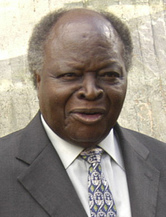 Image via Wikipedia
Image via Wikipedia
After the subsequent death of Jomo Kenyatta in 1978, the reins of power fell on the hands of Dictator Daniel Arap Moi who imposed similar sweeping measures while ruling over a single party government dominated by his henchmen and party stalwarts. He introduced a form of leadership style analogous to that of his predecessor by pioneering a ruling establishment that came to be known as ‘Nyayo’-a slogan implying ‘footsteps’ where he boisterously and meticulously put to profound use without the least deviation whatsoever.
A failed coup engineered by junior ranking members of the Kenya Air Force (now 82 Air Force) in 1982 made Daniel Moi more ravenous, authoritarian, and perhaps more rabble-rousing in dealing with opposition. Moi was shown the door and sent packing in 1992 after the birth of multiparty democracy-a fight organized by courageous opposition figures and Smith Hempstone-the fiery U.S. Ambassador to Kenya at that time together with strenuous pressure from the democratic world. Thus, Moi’s successor, Kenya’s current head of state, Mwai Kibaki, became the nation’s first leader in democratic Kenya .
Even with the implementation of political pluralism, political tensions flared-up in 2008 after a dispute arose between the two major political parties in a fraudulent election that saw opposing sides slaughter each other in the glare of television cameras leaving approximately two-thousand civilians dead and over three-hundred thousand displaced mainly in the agriculturally productive Rift Valley region. This ugly scenario between the forces of Raila Odinga who is the current prime minister and Mwai Kibaki led to an international intervention that brought in acclaimed dignitaries like Bishop Desmond Tutu, Graca Machel (widow of former Mozambican president Samora Machel and current wife of Nelson Mandela, former president of the Republic of South Africa), Kofi Anan (former Secretary General of the U.N.), John Kufuor (former president of Ghana), and Benjamin Mkapa (former president of Tanzania) among others. This international intervention led to sharing of power between the Nilotic Luo and Bantu Kikuyu respectively.
Consequently, Kenya’s newly promulgated constitution will replace the old one inherited from Kenya’s colonial master-Britain. It is a constitution that will equally apply to all Kenyans regardless of religion, race, gender, political affiliation, color, and sex. Provincial administrators will be replaced by elected governors; the nation will have upper and lower houses to be elected through the ballot; parliamentarians will be replaced by senators, and the law will apply equally to all in due course. Muslims and minority tribes who suffered for decades under former regimes will now have a say in the governing of the nation. Undoubtedly, the long neglected eastern and northeastern provinces dominated by Somalis will rise from the ashes of destruction and see dramatic rise in their levels of education, health, sanitation, infrastructure, and marketability. What was once the prerogative of the majority and the wealthy will finally and for the foreseeable future change hands and elevate the ranks of the downtrodden.


No comments:
Post a Comment